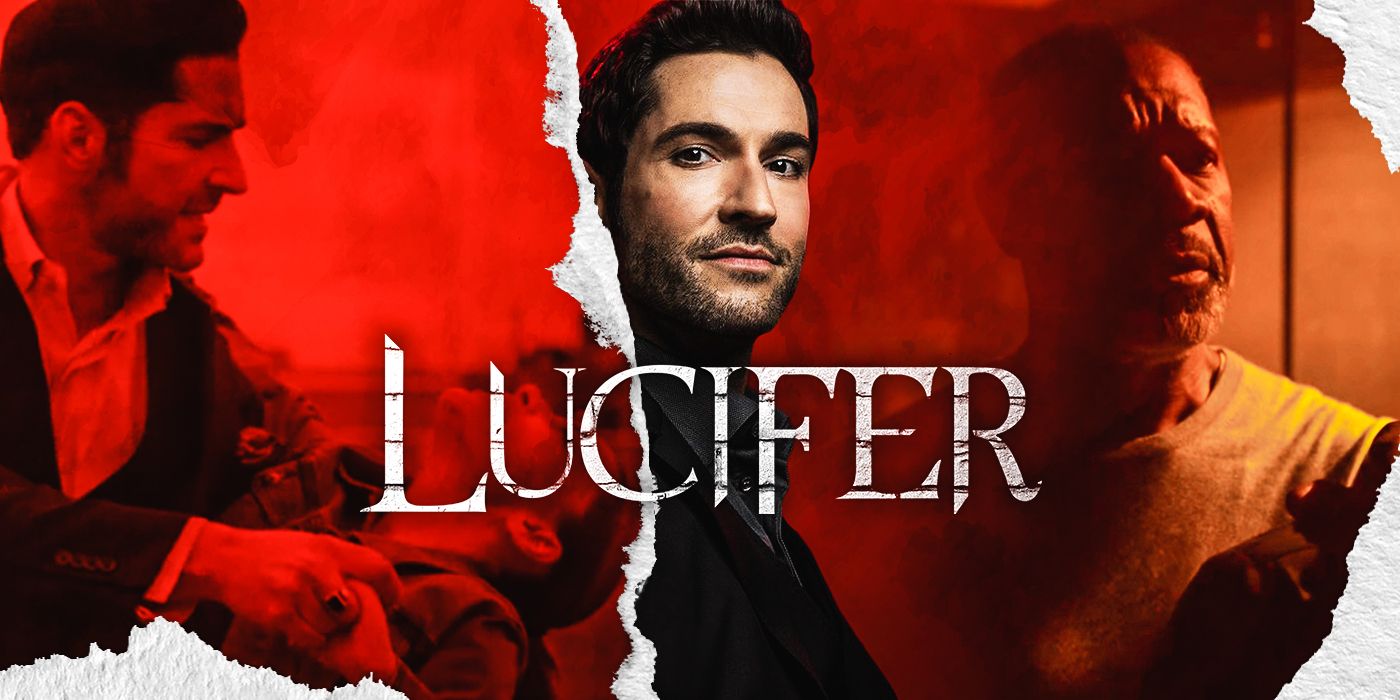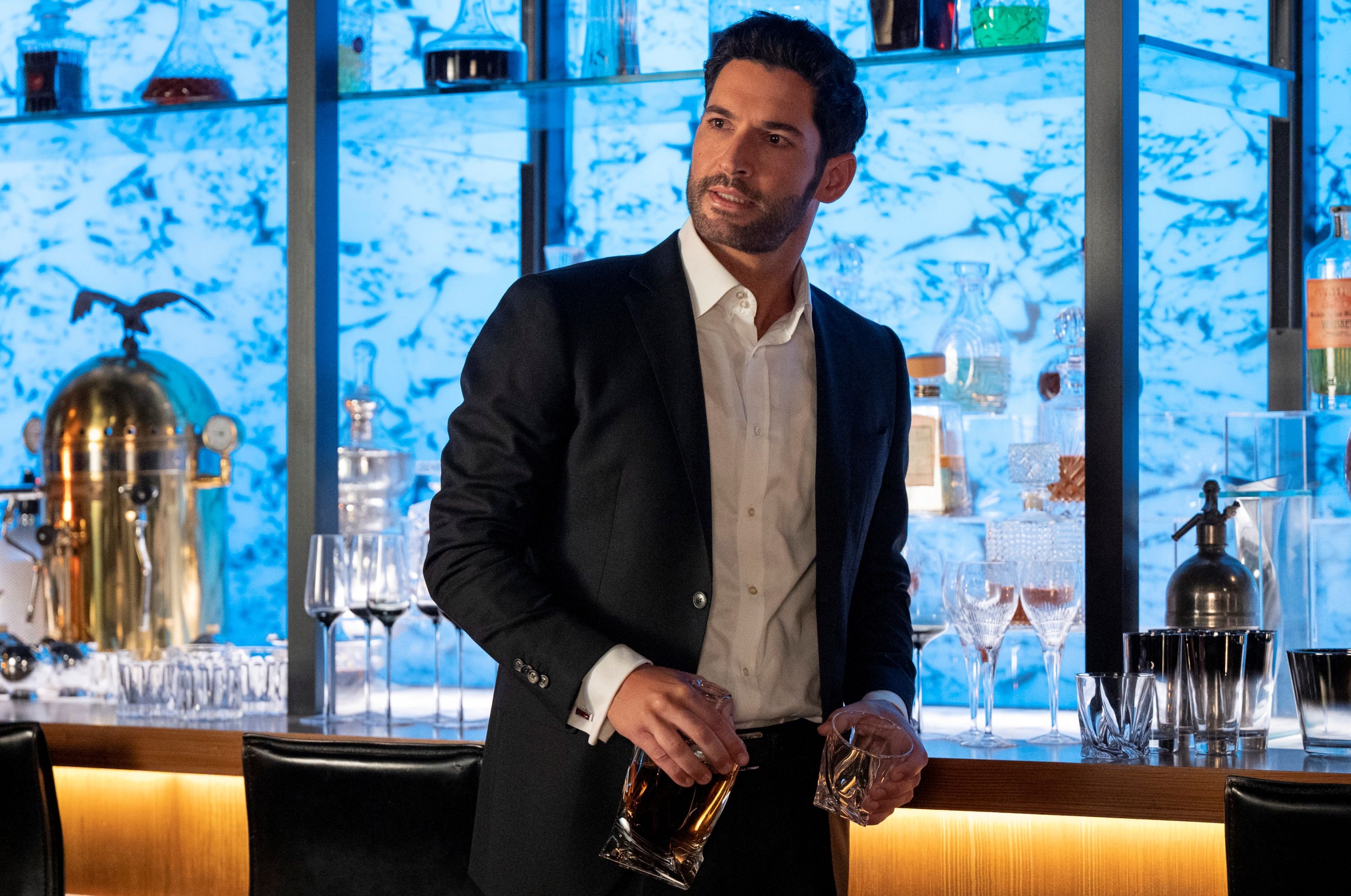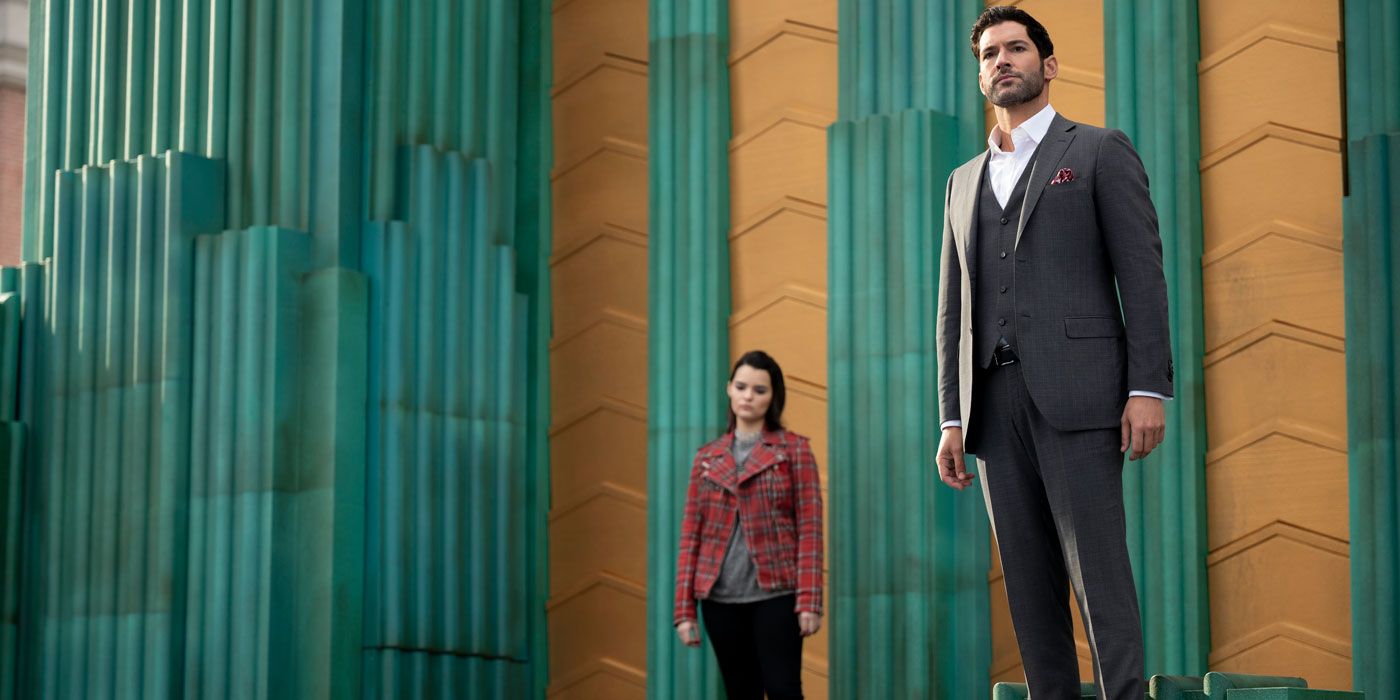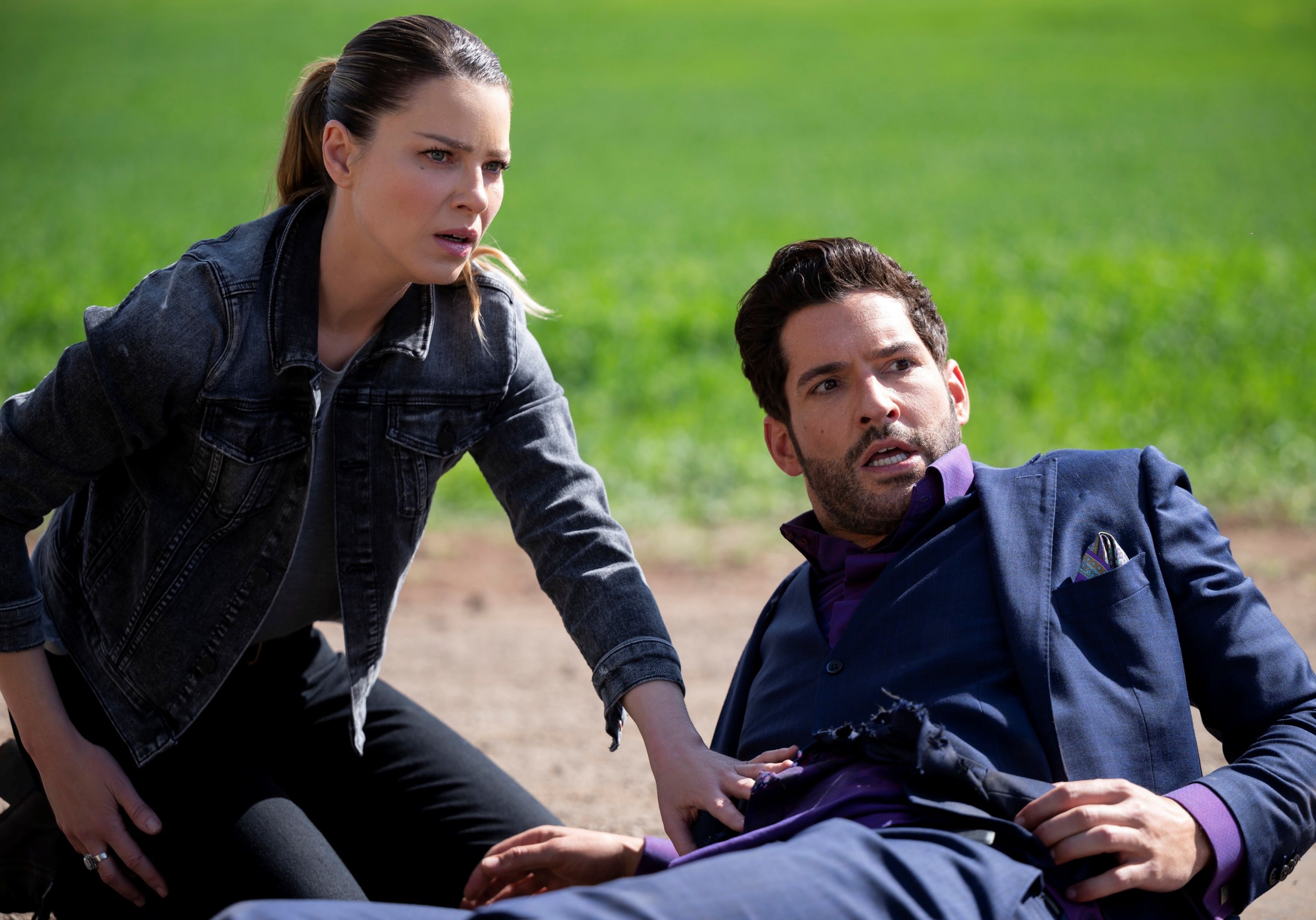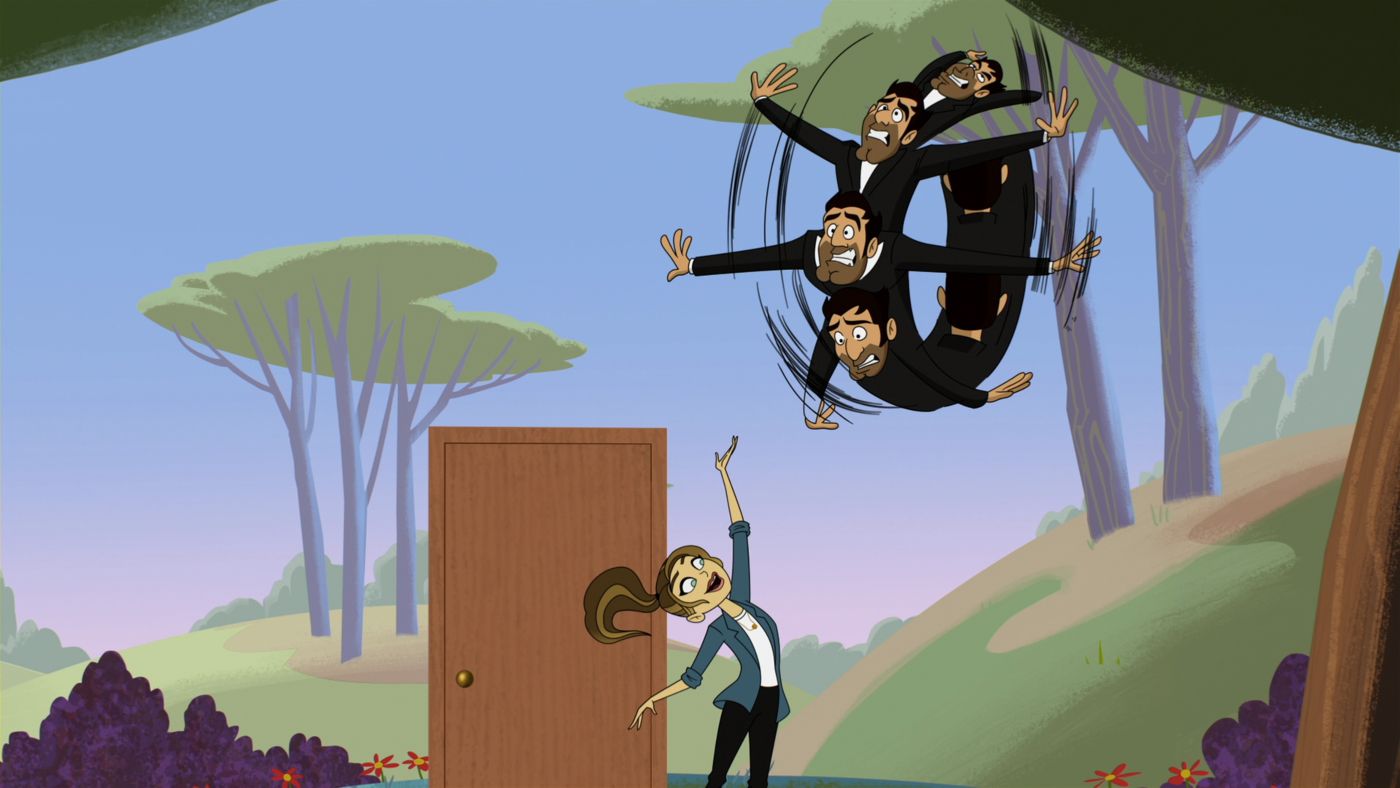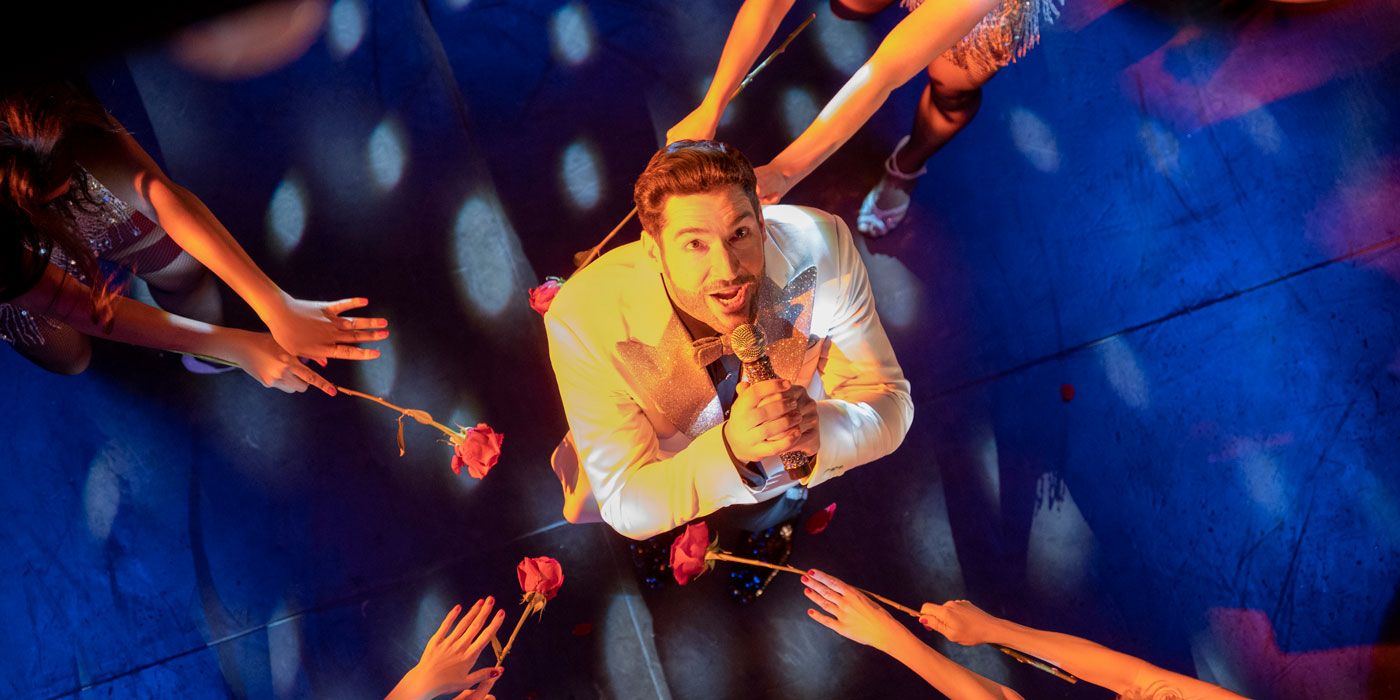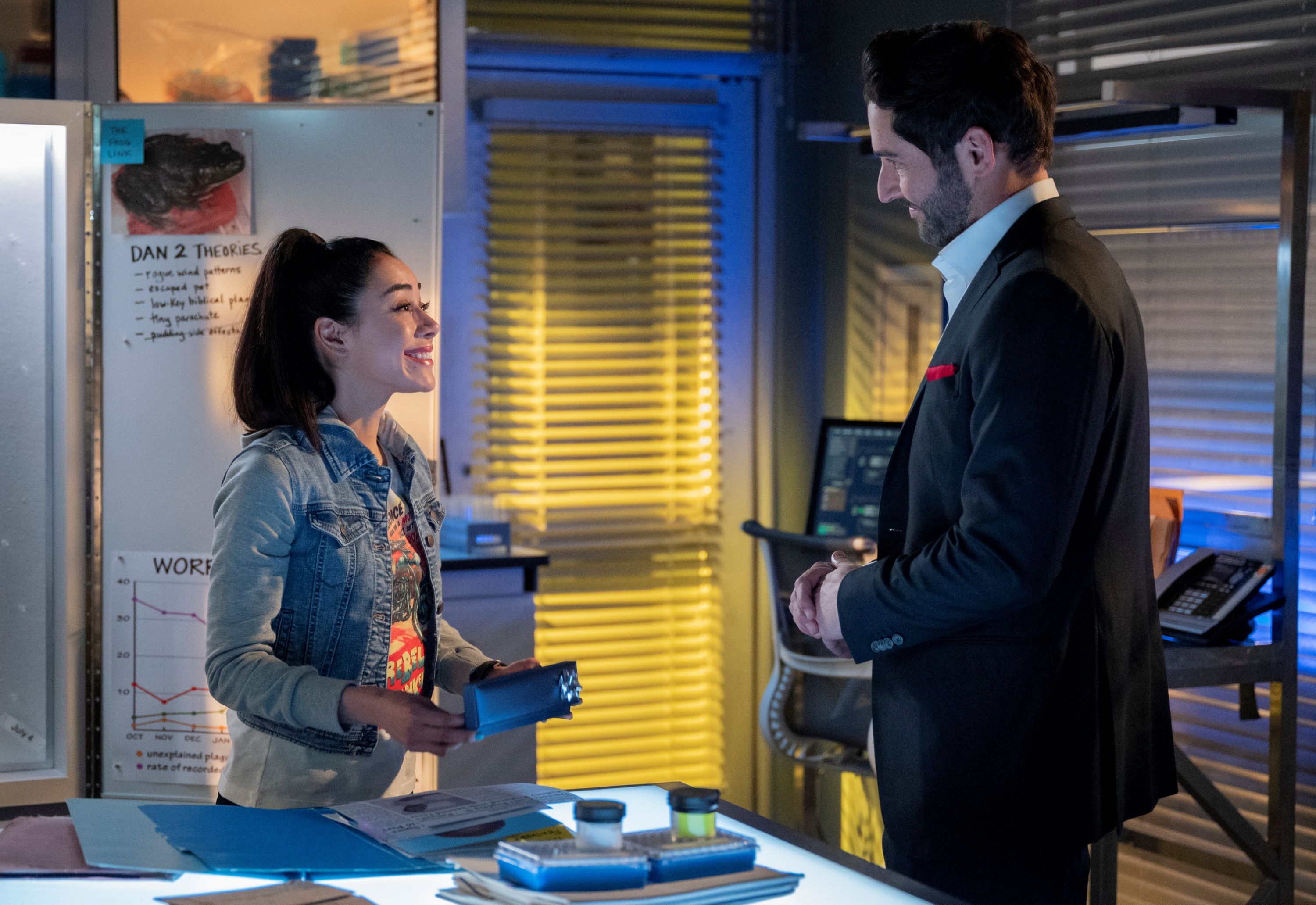[Editor's note: The following contains spoilers through the series finale of Lucifer, "Partners 'Til the End."]
There's something pretty special about the final season of Lucifer, which came about thanks to Netflix asking showrunners Joe Henderson and Ildy Modrovich about the possibility of a Season 6 — literally as they were writing the script for a Season 5 finale that would have brought the tale of our favorite crime-solving devil (Tom Ellis) to a close.
So, in an extended interview with Collider, Henderson and Modrovich detailed how exactly Season 6 evolved out of their original plans for ending the series, allowing these 10 episodes to essentially serve as an extended love letter to both the show as well as its fans. The showrunners were also able to provide insights into many of the season's most important elements, like the surprise arrival of Rory (Brianna Hildebrand), Lucifer's adult daughter from the future, and how it led to the show creating its own rules for time travel.
We also get into how COVID helped Henderson live out his dream of using animation in an episode, why it was important for Season 6 to address the Black Lives Matter movement and calls for police reform, how Avatar: The Last Airbender inspired one particular installment, and if there's anything they perhaps regret not getting to do over the course of the show's six season run.
Collider: So I'm gong to start with a question I've been dying to ask for a while — what was the original act of the original ending?
ILDY MODROVICH: I mean, essentially it is the same, the same way we ended Season 6 was how it was going to end in Season 5, but just the end point. For instance, Ella, she did find out about the truth, but in Season 5, it was that she was babysitting Charlie and Charlie's wings came out, you know what I mean? And then Linda and Amenadiel come home and they're like, oh, we might need to explain something. And she was like, I get it. So it was a very small mini-encapsulated version of what she went through in Season 6 — and that was the same for all our characters. We got to really, really go through the ups and downs of all of that.
Looking back, if we hadn't had that, my gosh, I feel like it was such a cathartic season. We really got to spend the time to say goodbye to these characters that we love. Maze and Eve, in our original Season 5 mini-ending, they were just going to get on a motorcycle and ride off into the sunset, but we got to have a wedding. We got to have an entire journey with them too. That's true of just all of our characters.
So you still had the same end point, which I imagine still involves Chloe dying?
JOE HENDERSON: Yes, yes. That was still in there. It was the idea that Chloe has a calling on Earth, Lucifer has a calling in Hell, and understanding that they had to be separate for a bit until they could be together again. But again, with this point of Season 6, we're able to really dig into the why. Why does Chloe need to be here? What is the cause that she needs to fight for? And really just sell the idea that these are two people who are always partners, but sometimes part of partnership is respecting that someone else has something important to do, and that you have to support them in that, even if it's hard, because maybe it's needed.
At what point in the process did you know that the show should essentially end with Lucifer becoming a therapist?
MODROVICH: Again, that was also in Season 5. I mean, when we thought we were going to end in Season 5, we knew that it was not ever his destiny, it never felt right for him to be God. And what felt right is for him to give back what he learned. What his unique perspective was. He knows what it's like to be the fallen one. He knows what it's like to self-hate and to not feel like he's worthy, and that was his super power. If he could help others out... Not like all Hell is worthy of redemption. There are some people in there that are... let's just be... You know. But there are the Dans of the world there, who put themselves there because of self-imposed guilt that maybe they don't deserve. So it just always felt right that he take that role on.
Yeah. The reason I asked about the when of it, is that I could have seen you guys coming up with that concept like back in Season 3.
MODROVICH: I'm trying to think when we did come up with it.
HENDERSON: I feel like, there has been a lot of times we've talked about Lucifer as rehabilitation. I think that the actual structure of it and the concept of changing Hell, happened early Season 5.
MODROVICH: Season 5, yeah, yeah.
HENDERSON: I think so and I'm happy to be proven wrong in two minutes when one of our writers texts us, he's like, no, this is what happened, because so much of the process is the fluidity of it. But it was one of those things where we just started to realize, okay, well, what is, what is the culmination of this character? And it's that Hell is a reflection of Lucifer. When he was down there, he tortured himself and people tortured themselves. Lucifer now believes in redemption and so he is now getting Hell to reflect this new version of themselves. And there's just something very beautiful about that thought.
Absolutely. So, talking about Season 6, at what point in the process did the concept of Lucifer and Chloe's daughter come in?
HENDERSON: When they called us saying, hey, JK, we actually do want a Season 6 if you guys have a story, we were like, no, we're good. We don't, we love our ending, we love everything, we're super happy, thank you, but no, thank you.
And they were like, just think about it. And you know, we're writers and, once you're given an opportunity to see if there's more story, you're going to start looking, and we sat down with the room and we sat down with each other and just talked through it a lot. And then we realized, well, we told this story of Lucifer understanding his father's perspective, understanding that his father was actually trying to do what was right by him. And then to sort of it becoming his father or about to become his father. And then it became the question of, okay, well, what if he did to his child, what he felt his father did to him?
Suddenly you have a whole new story, this idea of, okay, well, what if God abandoned you, what if you again abandoned your child? And then it became the question of, well, how would that happen? And that story, that's fun. And then we were just running downhill because that's an exciting mystery for Lucifer to solve, for us to solve. And it gave us so much story.
MODROVICH: We didn't set off like "I think we'll tell a time travel story for Season 6." That was a means to an end, which is the only way personally, it could have been a time travel story — because they break my head. We knew we wanted Lucifer to be in his dad's shoes, because it was the final chapter, but then, how does it feel to be on the other end of an experience and to be the one causing the pain? And so we just had to get his adult child into our show, somehow.
HENDERSON: Super easy.
Time travel works! I mean, there is a part of me that, as I was watching, was occasionally wondering, oh, is she going to be suddenly revealed to be lying the whole time? Is she a demon? Is this all a big trick? And I think part of that was because there really isn't necessarily a Big Bad for this season. Was that a conscious choice or was it something that kind of just evolved out of those conversations?
MODROVICH: I mean, for all of our Big Bads, if you look back at the seasons, all of our Big Bads are really the heroes of their own journey, whatever that may be. And our main Big Bad we realized is usually Lucifer wrestling with something internally. He's his own worst enemy. That hopefully was the most interesting part of our past seasons. And so this was just an extension of that too. The fact that Rory is the Big Bad, just like Michael was, but it's more about Lucifer contending with, oh my God I'm my father — that was actually a more interesting thing to battle than some dude with a gun or something.
HENDERSON: It's interesting. Because technically, Lucifer is the Big Bad of Rory's journey to some extent, and Lucifer's hearing this and doesn't believe it, but also is increasingly realizing it's true. As he goes through this, the mystery of why do I abandon my child? The act Lucifer somehow does in the future is the Big Bad in Season 6. And it was also important to us to have that be, because of Rory — not Rory's fault, Rory's choice. That was super important to us, to bring it full circle.
You might have tipped your hand a bit about this already, but it's your own universe — you're making up all of the roles as you see fit. Were there ever discussions about, hey, our version of time traveling can change the future?
HENDERSON: Yeah, we walked down every time travel path. And ultimately we really landed on the idea that a closed loop paradox, it's clean, it's simple, it doesn't distract you with a bunch of rules, but also it speaks to how, as much as we are a crazy world with rules that can bend and break, we're holding to them, we're sticking to them.
And also, maybe it's a good thing, because guess what? Rory had a great mom. She grew up into a great kid, and we wanted, we really, it was exciting to be able to illustrate that and speak to that, and speak to the idea that she doesn't want to be different. There's that line where she's like, "don't change me." She loves who she is. She's a great person.
Yeah. I think that all makes sense, given that she doesn't hit the point of wanting to go back and confront Lucifer until she hits the deathbed situation.
HENDERSON: That's right. Yeah. And we did play with full disclosure. We did play with that, because we talked so much about choice versus free will, we talked about, well, let's see, can we just choose to break this loop? What would happen? And the more important theme was the relatable one, which was, despite all the crap we go through in our lives, you got to look at it and go, "that made me, that made me who I am." And if you get to the point where you love yourself, which, Rory does, and Lucifer does, you can't say, I wish that didn't happen now. You can't go back and go, I don't want that. Now you embrace the bad with the good. That's our whole show, that the dark side and the light side. It's all there for a reason. And there's a balance there. So that became the most important thing we wanted to say.
So I have a couple of episode-specific questions. To start, at what point in the conversation did an animated episode become something you really wanted to do?
HENDERSON: I mean, it's something I've always wanted to do. I just didn't think I'd actually get to, because it's just such an undertaking. But it was COVID and we were looking for ways to have fewer days on set. And so the problem became the opportunity, because I secretly had been wanting to do it for years. And then we got super lucky because the people that do Harley Quinn, Jennifer Coyle and her team, were available. So we had this just incredibly lucky window of time where you have these animators who can just bring so much humanity to cartoons. And so it was just this wonderful confluence, but it really was a big part of it was COVID and us going, okay, how do we have less shooting days? And also wanting to shoot to play with Hell sequences — we're like, okay, well, here's an excuse. Here's a way to do it, that is organic to our show, similar to what Ildy had to find in her musical episode. We can't just do an animated episode. How do you earn it within the show? How do you earn it within the language of the show? That was important.
Excellent. I was trying to identify what the animation style reminded me of and so of course it was Harley Quinn. When you had that opportunity, was it like, we just want to kind of echo that same visual approach?
HENDERSON: Well, it was interesting because when we talked to them early on, we were sort of talking about doing a Hanna-Barbera style, and then they actually worked a bunch of Looney Tunes influence in there as well, which you very much see. I mean, we gave them our instincts and they just flew. They're amazing. They're just incredible to work with. We had the starting point, but they brought it to life.
MODROVICH: And the style fit with the story of this kid who grew up watching cartoons to kind of tether him to some kind of stability...
HENDERSON: Yeah, yeah, 100 percent.
The season also really digs into the question of police reform — I know that my colleague Christina Radish talked to DB [Woodside] about the fact that he was pretty reluctant initially to take that on and have the character become a cop, but he felt like he could after conversations with you. So I'd like to get your side of why it was important for you to take that narrative approach?
MODROVICH: Well, when we all got together in the room at the beginning of Season 6, we talked a lot about the fact that we're a cop show. Are we going to just ignore that? With all that is happening around us? And we knew none of us wanted to ignore it. We wanted to talk about it and deal with it, but in our way, in the context of our show, which was through a character and through the emotion of a character.
We already had this story that we had started in Season 4 with Amenadiel and Caleb, and we just kind of extended that story and really went into copaganda and what that means, and Black Lives Matter, and it all kind of came together in that we wanted to show it from an emotional angle, and not preach at people or try to, but to just say, this is how it feels to the character in Episode 6, who gets blamed for a murder she didn't commit. How does that feel? We just wanted to make an impact that way.
Do you feel like if there had been a longer season or a seventh season, you would have been able to dig more into that?
HENDERSON: I think we would have felt a responsibility to, and wanted to. I think it's like [Modrovich] was saying — we have a role in copaganda, and it's something that we really soul-searched on. On a lot of cop shows you show how like, hey, sometimes you can blur the lines, but it's for the greater good. And that's a narrative that can be very problematic, as it has been illustrated more than ever over the past couple of years. And so I think it's something that we wouldn't have been able to shy away from or wanted to.
MODROVICH: And also, there aren't all bad cops. We know this, and Chloe is an example of that, her father was an example of that. And, so it was important to watch it from her perspective, to really recognize that there's a systematic problem, and to go, "there it is." Point at it, talk about it, and not pretend it's not there.
Also, I'm very curious about Episode 8, because you get to break the fourth wall to some degree. Talk to me a little bit about the conception of that episode.
HENDERSON: I mean, I'll tell you where I was coming from on it, which was, there's an episode of Avatar: The Last Airbender, where towards the end of the season, all the characters go to a play and they watch themselves being dramatized onstage. And you get all of these in-jokes in the sense of how other people see them and all this. [Executive story editor] Jen Imada and I in particular were obsessed with that. And then with Aiyana [White, also an executive story editor] and Ildy and everyone else, we started to actually turn it into what's our version of it. How do we have a love letter to the show? How do we play with breaking the rules a bit, but also maintain the rules? And the answer was [Linda's] book.
So then it became, okay, if the book is our device, let's play with perspective, let's play with how everyone saw different moments happening and try to find a way to explore each one. Like here's how Lucifer sees the world. Here's how Dan and Maze see the exact same scene, but from different perspectives. We're like, what is our version of this sort of retrospective "this is your life"? That was super fun, because it's our love letter episode.
Were there budget elements to it as well? Just because it feels like an episode that was not necessarily very expensive to produce.
MODROVICH: It's funny, but no, I mean, it does feel a little bit like a bottle episode, but it wasn't by design. And it's funny, because DB directed that episode — and he found lots of ways to add money onto there, just saying. I mean, the part where [Amenadiel] flies and he does this amazing spin thing, it was great. That was all D.B. That was all like his vision. He also shot sets that we've seen a million times in a way that I would never seen, like for instance, Linda's office, he created this whole thing where we went outside the office and he did this one-er, where the camera's outside and Lucifer and Linda are arriving and it's late at night and she's turning on lights and you're like a voyeur outside and it's a fantastic shot.
I also want to ask a little bit about Ella figuring out what was going on — you mentioned that the original ending would've just involved her figuring it out after babysitting Charlie. Was there a fan reaction you were going off when it came to her putting together the clues on her own during Season 6?
HENDERSON: Honestly, it was just us going, how do we make this different? And one of the ways to make it different is to have her be the first one to figure it out, and to be a forensic scientist and put things together. We love the idea, no matter what, of her, as a person of faith, not being especially freaked out about the fact that there's gods and angels. So when she's holding Charlie, it's like, oh, the fun of it is that she's like, oh actually this makes a lot of sense. She's not freaked out, just kind of excited about it. But what we were allowed to do in Season 6 because of the extra time was expand out and play with that idea of, okay, why didn't they tell me? Why did they keep this from me? Why did they choose to leave me out of this? And why aren't they telling me about the end of the world? The irony being that they just don't know.
MODROVICH: Yeah, the FOMO of it all, especially for Ella's character, who wants to be a part of everything — she's most sad that they just didn't tell her.
The end of the world thing is an interesting element of the season, just because I feel like, especially these days, you spend five minutes reading the news and it's not hard to feel the apocalyptic vibes. What inspired the idea of walking up to it — and then also walking it back?
HENDERSON: It felt like the way to do the end of the world in our way. Right? Cause we were playing with this idea, okay the world is ending. And then we're like, okay, we'll figure out what that means later, because the fun of it is, that's the mystery. Right? So then it was like, all right, what if we had the end of the world? What if this is clearly happening? How do we explain it? But how do we make it us? How do we make it our show?
Because the truth of it is, we don't do "end of the world." What we do is people making decisions, people making choices. And then when we found the idea of, well, what if the angels are trying to do good and instead creating the situation that could be the end of the world via their attempts there, they learned the wrong lesson or they learned the right lesson, but learned it the wrong way. Those are the kinds of things that are super fun to explore and feel like our show.
To wrap up... Using the word regret feels wrong, but is there something that you wish you'd gotten to do, like a t-shirt you wish Ella could have worn, or a song cue you would have gotten to include, that sort of thing?
HENDERSON: I wish I could have gotten Dave Matthews in Season 2, for the song Lucifer sings on stage for Chloe. That was one of the first requests we made and they turned us down because we relentlessly made fun of Dave Matthews Band in the same episode, which, lesson learned. But I love Dave Matthews Band.
MODROVICH: I'd say puppets for sure.
HENDERSON: We got puppets.
MODROVICH: Oh shoot. We did do puppets.
HENDERSON: Thanks for watching my episode, Ildy. [Editor's note: The episode in question is Season 3, Episode 2, "The One With the Baby Carrot," written by Henderson.]
MODROVICH: Sorry. How about the porn episode? No. You know, this is something very controversial. It would have been wonderful to have Lauren sing. And it was a thing that we went back and forth on throughout the seasons, especially around the musical. And I never really talked about it because I never wanted to pressure her, and nobody wanted to pressure her. But the truth is she has a beautiful, beautiful voice. Not everybody is comfortable singing in public and I totally get it. But, that is something I sort of wish, that the world could hear the German sing.
HENDERSON: Beautiful voice.
MODROVICH: Pretty lovely. Yeah.
Lucifer Season 6 is streaming now on Netflix.

